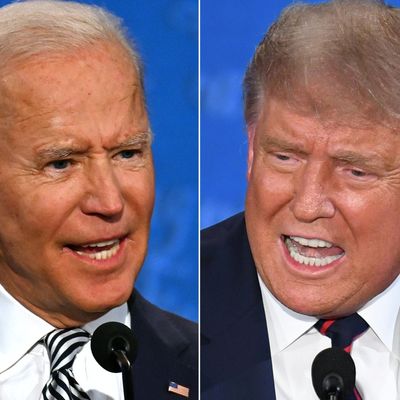
It’s hard to recover from a night of watching crosstalk between three septuagenarians, let alone to stomach the thought of watching two more presidential debates. For 90 minutes, Donald Trump did his best Hulk Hogan impression while Joe Biden tried to fend off the attacks in folksy exasperation (“Will you shut up, man?”). The president refused to condemn white supremacy or display basic manners taught in kindergarten, and it was impossible to discern how either man would run the country for the next four years.
In response, the Commission on Presidential Debates vowed on Wednesday to make structural changes that would ensure “a more orderly discussion of the issues” going forward. But instead of tweaking a flawed model, why not get rid of debates altogether? There’s a strong case to be made.
Even before Trump turned the stage into his personal wrestling ring, there have been good arguments for nixing this political ritual. While there’s some evidence to show that primary debates sway voters, since many have not yet made up their minds, the impact on presidential elections is negligible. They can slightly tip the scale in favor of one candidate, which might make a difference in very close races, but for the most part viewers have already made up their minds before tuning in. (This phenomenon is more true than ever in a hyperpolarized political environment where Republicans and Democratics seem to be operating on a completely different set of facts–only 3% of voters are undecided, according to a recent poll.)
People watch presidential debates to cheer on the home team rather than to gather information about who to vote for. And their support doesn’t waver if a candidate tanks onstage, due in large part to a psychological concept called “motivated reasoning,” in which viewers distort or ignore facts to maintain their political beliefs. After last night’s debate, Trump supporters will remember how Biden seemed weak against a bullish leader, while fans of the former Vice President saw a principled man trying to ignore a petulant bully. Throughout history two different stories have emerged, set neatly along partisan lines: After a 2008 presidential debate, a CNN poll found that 85 percent of Democrats thought Barack Obama had won against John McCain, yet only 16 percent of Republicans agreed; the same pattern was replicated with Hillary Clinton and Donald Trump. Viewers are desperate to avoid cognitive dissonance, the discomfort that arises when, say, a politician you plan to vote for is caught lying. So instead, they tell themselves a different story and double-down on their support.
Even if debates were effective, they rarely test the very qualities that would make a politician best suited for the job, like being collaborative, competent or trustworthy. It’s T.V., afterall, and viewers hone in on the most surface, entertaining moments, like senator Amy Klobuchar’s inability to remember the president of Mexico, Al Gore’s audible sighs during his debates with George W. Bush, or on how McCain’s skin looked bad on HDTV. (Candidates who are considered attractive benefit more from debates, according to researchers at M.I.T.)
But beyond these surface assessments, the debate format rewards the most charismatic, aggressively competitive leader, rather than the best politician. These events are considered high-stake job interviews, a flawed process that often doesn’t result in getting the best person for the role. Hiring managers, just like viewers, assume their emotional impressions of someone correlate with a professional skill. Instead, studies show that in-person interviews lead people to make more biased, misguided hires than would those who base their decisions on facts, like someone’s grades or past job performance.
As a former reality T.V. star, Trump knows better than anyone how to exploit the debate format to his advantage. In the primaries he was loud and narcissistic, saying he would only accept the election results if he won. His bluster was a smart move, since whichever candidate dominates at the outset often gets the most camera time, especially in split screen shots that are designed to amp up the drama, according to Patrick Stewart, a political science professor at the University of Arkansas. Trump engages the audience, encouraging them to boo and cheer like they’re watching a football game. With no crowd to pander to last night, Trump instead went with “pure, unadulterated aggression,” said Stewart.
But perhaps the most important reason to ax these particular debates is that Trump uses them to spread lies, knowing that oversimplified sound bites are catchier than nuanced, truthful information. It doesn’t matter that there’s no proof mail-in voting will lead to massive fraud: Research shows that if people hear something repeated enough times, they’ll start believing it’s true. Some political experts question whether it’s even ethically responsible to have debates when Trump is so untethered from reality. Unless the moderators start fact-checking claims and have the ability to mute the president’s mic, the next two debates should be canceled, says Jesse Donahue, a political-science professor at Saginaw Valley State University. Otherwise, she says, it’s a forum for “sharing misinformation with the entire country.”
It’s hard to get rid of such a long-standing tradition. Despite the complaints on social media, many people seem to like the spectacle. And some political experts think there’s real value in debates, saying they can mobilize voters to show up at the polls and give important cues about a candidate’s temperament. But there has to be a better solution. Most industries have come up with ways to test skill over personality — in journalism we give edit tests, lots of restaurants do trial shifts, and Google makes its prospective computer programmers write code. Stewart says that during the primaries, politicians should be filmed in unscripted, reality-style segments while they try to fix problems like crime and drug use in communities. A little unusual, not to mention potentially impractical in a pandemic, but I like the idea of testing whether or not politicians can do the actual job, rather than how good they are at chest-thumping in front of a crowd.
In the meantime, maybe Trump will be less aggressive at the next debate — a town-hall format where he might tone down the bluster to connect with voters. But I don’t blame anyone who doesn’t bother to find out.





